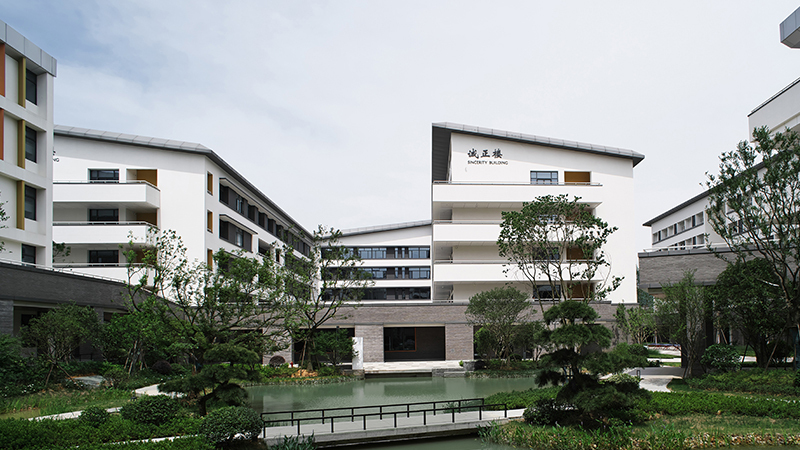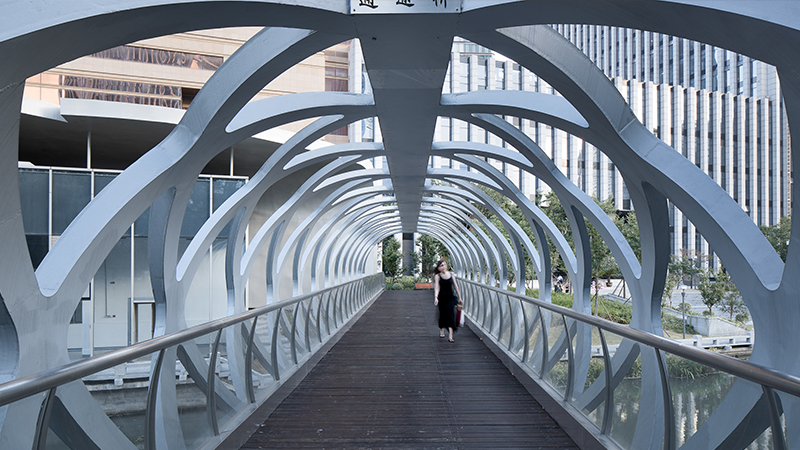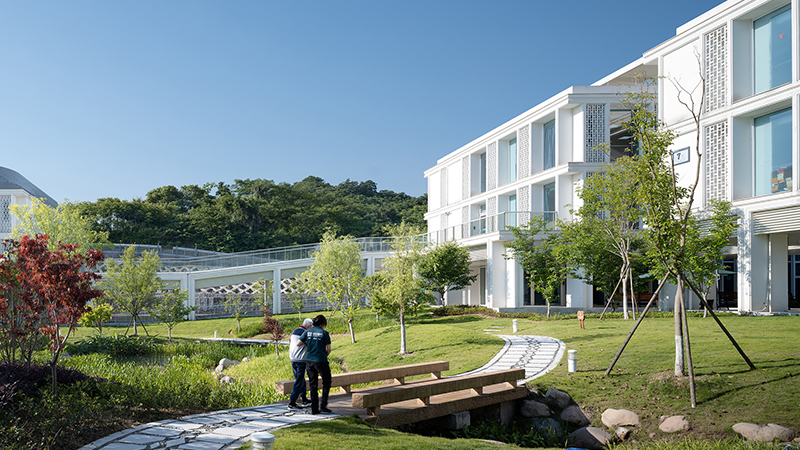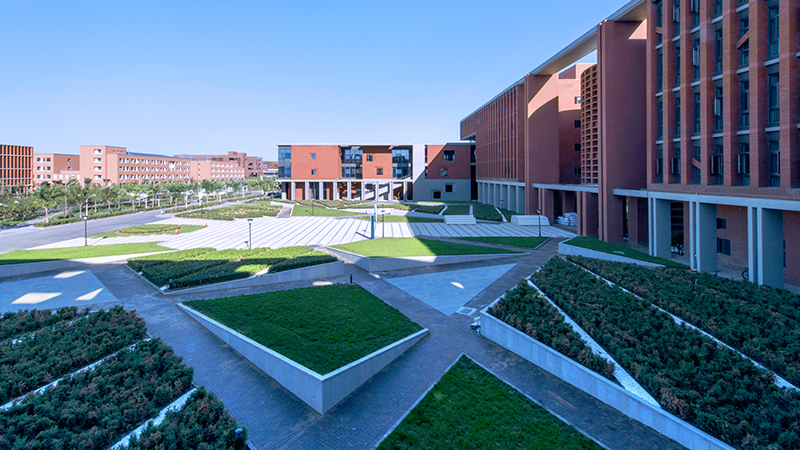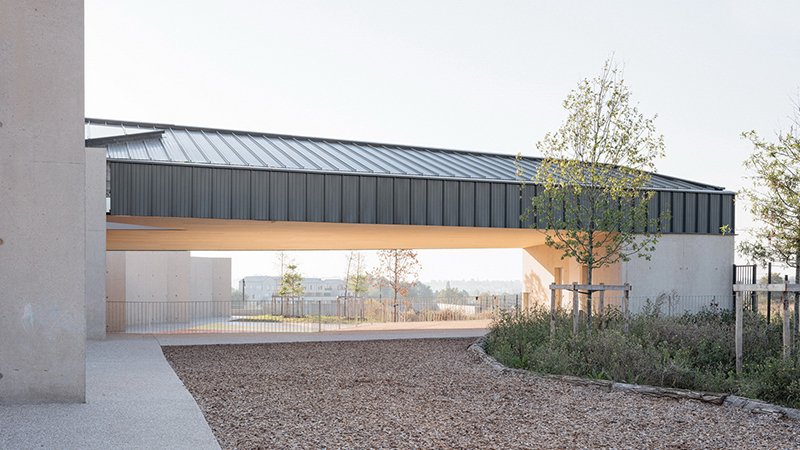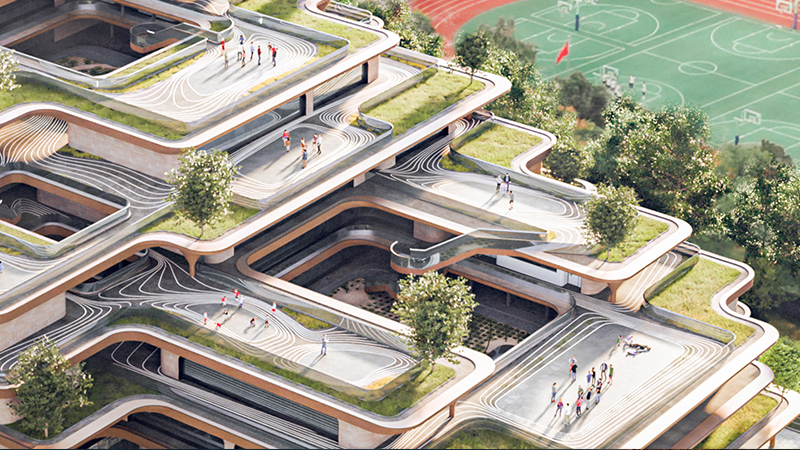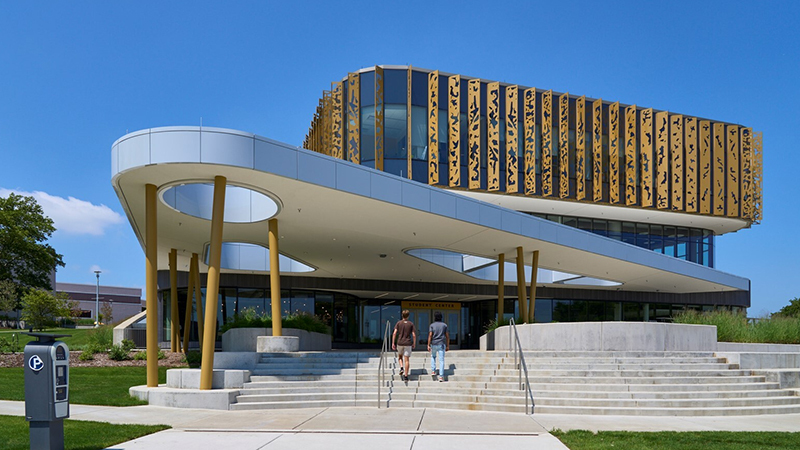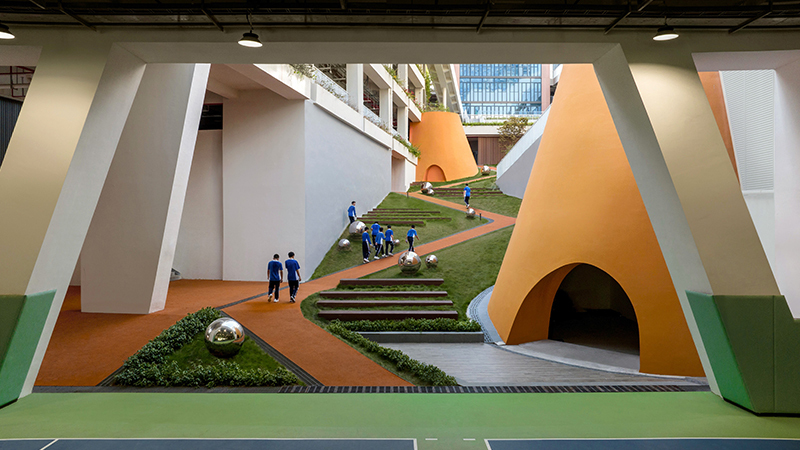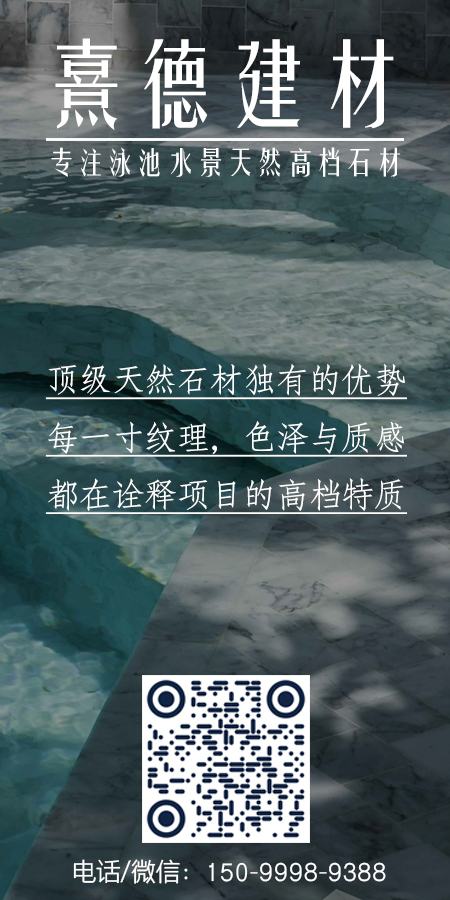| 公司: | 浙江大学建筑设计研究院 | 类型: | 建筑 |
|---|---|---|---|
| 地区: | 中国 | 标签: | 学校 |
▽绍兴艺术学校及绍兴演艺集团共同推进“校团合作”改革
Shaoxing Art School and Shaoxing Performing Arts Group jointly promoting the reform of "school-group cooperation"
绍兴艺术学校前身为浙江绍剧艺训班,于2003年建成并启用了现在位于绍兴市二环西路的校区。经过近20年的发展,现有校区已无法满足学科规划及后续发展需要,这是本次改扩建更新的起因。同时为了推进“校团合作”改革,新征南侧三角地作为新组建的绍兴演艺集团综合楼的建设用地。两个单位独立管理,但希望有机融合、资源共享。
The Shaoxing Art School, formerly known as the Zhejiang Shaoxing Opera Art Training Class, was completed and opened in 2003, with its current campus located on the west of Second Ring Road in Shaoxing City. Over nearly 20 years of development, the existing campus is no longer able to meet the needs of disciplinary planning and subsequent development, which is the reason for the transformation and expansion. In addition, in order to promote the reform of "school-league cooperation", the southern triangular area has been newly expropriated to serve as the construction site for the comprehensive building of the recently established Shaoxing Performing Arts Group. Two units operate independently, but they hope for organic integration and resource sharing.
▽改造前后实景照片对比
Before and after the renovation
场地 Site
新征用地补齐了场地的南部拼图,使整个用地呈倒三角形。西临二环西路,是校园与城市连接的唯一界面,东侧与北侧均由河道环绕,往东望是连续的自然山体,周边环境资源较为优越。
The newly expropriated land completes the southern portion of the site, making the entire land in an inverted triangle shape. The west side of Second Ring Road is the only interface connecting the campus and the city. The east and north sides are surrounded by rivers, and the view eastward is continuous natural mountains, with superior environmental resources in the surrounding area.
▽场地原始照片
Original photo of the site
现有校园西侧垂直于城市道路是教学实训组团,东侧与河道呈正交关系的是生活及运动组团。校园布局与非平行的三角边界相呼应,形成了两个方向的肌理网格。根据设计要求,生活运动组团全部保留,仅做立面改造,教学组团保留公共教学楼及核心的音乐厅。所以,在原有校园两个方向的肌理网格中均有保留建筑,这是校园布局重构的重要线索。
On the west side of the existing campus, which is perpendicular to the urban road, are the teaching and training clusters, while on the east side, which is orthogonal to the river, are the living and sports clusters. The campus layout corresponds to non-parallel triangular boundaries, forming a textured grid in two directions. As per the design requirements, all living and sports clusters will be preserved, with only facade renovation. The teaching cluster will have the public teaching building and the core music hall preserved. So, there will be preserved buildings in both directions of the original campus texture grid, which are important leads for the reconstruction of campus layout.
▽总平面图前后对比
Comparison of previous and present general layout plans
重构 Reconstruction
经过多年的运行使用,绍兴艺校原有校园已形成稳定的校园肌理及空间格局。我们尊重时间的痕迹,希望留存场地记忆。所以基于明显的场地肌理及多重设计要求,场地新秩序的重构显得自然而然。
Over years of use, the original campus of Shaoxing Art School has formed a stable campus texture and spatial pattern. We respect the traces of time and hope to preserve the memories of the site. Therefore, based on the obvious site texture and multiple design requirements, the reconstruction of the new order of the site appears to be natural.
▽新建、保留建筑示意
Concept of new construction and preservation of existing buildings
保留面向二环西路的主入口形象。进入主校门,为了加强音乐厅的主体地位,在其西侧面向主广场加建入口棚架,广场南侧临水是新建的戏曲及音乐艺术楼,北侧是新建的行政综合楼,两者以曲线形体环绕音乐厅。再往北是保留的公共教学楼、新建的舞蹈实训楼,整个教学实训组团布局在原有肌理上发展,复原并重构了东西方向的校园主轴形象。
The main entrance facing the west of Second Ring Road will be preserved. Upon entering the main school gate, a canopy frame will be added to the west side, facing the main square, to strengthen the main position of the music hall. To the south of the square, facing the water, a new opera and music art building will be constructed. To the north, a new administrative complex will be erected. Both buildings will be curved, enveloping the music hall. Further north are the preserved public teaching buildings and newly built dance training buildings. The entire teaching and training cluster layout will be developed on the original texture, restoring and reconstructing the east-west campus axis.
▽重构面向二环西路的校园主入口形象
Reconstruction of the campus main entrance facing Erhuan West Road
顺应生活运动组团的空间肌理,在体育馆南侧加建小剧场,串联南侧新征用地的演艺集团综合楼,小剧场成为艺校和演艺集团的共享功能区,满足了两个单位的共同期望。
In line with the spatial texture of the living and sports clusters, a small theater will be added to the south side of the gymnasium. This will connect to the newly comprehensive building of the Shaoxing Performing Arts Group in the new land area on the south side. The small theater will serve as a shared functional area between the art school and the Performing Arts Group, fulfilling the common expectations of both units.
▽顺应生活运动组团的空间肌理形成南北文化功能轴
Formation of a north-south cultural functional axis in line with the spatial texture of the life and exercise
东西片区的布局不是简单的遵从原有校园肌理,而是对边界形态、空间格局的重新呼应与构建。通过入口广场的重塑以及两大片区交汇处的圆形文化广场、南北步行街区、各处建筑之间开放空间的渗透,有机融合了整个校园空间架构,由此进一步刻画出了绍兴艺校独特的双网格空间形态特征。
The layout of the east and west areas will not simply follow the original campus texture; it will involve a re-echoing and reconstruction of the boundary form and spatial pattern. By reshaping the entrance square, the circular cultural square at the intersection of the two major areas, the north-south pedestrian block, and the infiltration of open spaces between various buildings, the entire campus spatial structure will be organically integrated. This approach further depicts the unique dual-grid spatial characteristics of Shaoxing Art School.
▽沿文化功能主轴由南至北看教学楼、剧场群体以及远处圆形文化广场
Viewing the teaching buildings, theater complexes, and circular cultural plaza in the distance from south to north along the main cultural axis
▽整体校园呈现双网格空间形态特征
The overall campus presenting a dual-grid spatial form
情境营造 Scenario rendering
立足于此地、此时,营造此境、此情。在重构肌理文脉、功能流线、场所环境、形式风貌的同时,更关注场所空间能否与使用者的行为、体验、情感、意识产生“共情”。
Rooted in this place and time, it aims to create this atmosphere and evoke these emotions. While reconstructing the texture and context, functional flow, venue environment, and formal style, more attention should be paid to whether the venue space can resonate with the user's behavior, experience, emotions, and consciousness.
设计将校园机动车流线设置在外围,内部实现全域步行化。广场、连廊、院落、平台等在校园不同功能区之间构建了多维度的联系,使师生在各个时间段的行为流线得以串联,营造了无处不在的教学、交流、休闲空间。
The design includes motor vehicle flow lines on the periphery, ensuring that the entire campus remains inaccessible to vehicles. Squares, vestibules, courtyards, platforms, and other facilities will establish multidimensional connections between different functional areas across the campus, connecting the movements of teachers and students at different time periods, creating ubiquitous spaces for teaching, communication, and leisure.
校园主广场一改之前的单一与直白,下沉绿地由一圈台阶围绕,学生可坐可停留,正面的音乐厅放大了入口台阶,并加建醒目门廊,不仅仅是强化音乐厅的主体形象,更是为了大台阶与门前小广场成为戏曲专业学生的室外课堂或排练、练功的场所。
The main campus square will be transformed from its originally monotonous tone to a sunken green space surrounded by a circle of steps, offering seats for students. The entrance steps of the front music hall will be enlarged, with a prominent porch added, which not only strengthens the subject image of the music hall, but also serves as an outdoor classroom or venue for rehearsal and practice for students majoring in traditional Chinese opera.
▽音乐厅入口空间加建门廊强化主体形象
An additional porch in the entrance space of the music hall to strengthen the subject image
▽音乐厅入口台阶与门前小广场成为室外课堂或排练、练功的场所
Music hall entrance steps and the front square transformed into an outdoor classroom or venue for rehearsal and practice
基于对师生行为及中职学校教学模式的充分分析后,教学组团由一条连廊南北贯穿,将戏曲与音乐专业共设于教学南区并共用理论教室,名师工作室与教学场地贴邻,教师琴房与学生琴房共处,琴房与剧场就近设置,均可潜移默化地改变学生的学习方式,促进不同专业学生之间的互补,激发师生们的创作灵感。
Based on a thorough analysis of the behavior of teachers and students, as well as the teaching mode of secondary vocational schools, the teaching cluster will consist of a vestibule running north-south. The venues for opera and music majors will be co-located in the southern teaching area with the theoretical course classrooms. The teacher studios will be adjacent to the teaching venue, and the teacher and student piano rooms will be shared. The piano rooms and theaters will be set up nearby, which will subtly change students' learning methods, promoting complementarity between students from different majors and stimulating creative inspiration for teachers and students.
▽南北连廊贯穿的教学组团
Teaching cluster traversed by the north-south corridor
教学组团和生活运动组团之间是南北向的步行街区,串联宿舍、食堂、教室、体育馆、专业楼、剧场,几乎汇集了整个校园的所有功能,使上课、下课、排练、演出、就餐、休闲等多种事件行为就近发生。我们希望看到这样的场景:课间,成群的学生匆忙赶往各自课堂;课余,学生三三两两在这里交谈、嬉闹,清晨或傍晚,戏曲专业的学生甚至在路边某个角落练功,旁边剧场的排练厅有铿锵的锣鼓声传出,南端的琴房则响起悠扬的钢琴曲…场所与人的活动共融、人与环境共情,这是校园空间重构的重要目标。
Between the teaching cluster and the living and sports cluster lies a north-south pedestrian street, linking dormitories, canteens, classrooms, the gymnasium, teaching buildings, and theaters. Almost all functions of the entire campus are centralized here, facilitating various events such as in-class and after-class activities, rehearsals, performances, dining, and leisure. We hope to see such a scene: during breaks, groups of students rush to their respective classrooms; in their spare time, students chat and play here in groups; in the morning or evening, students majoring in traditional Chinese opera practice in a corner of the roadside. The rehearsal hall of the nearby theater emits a resounding sound of gongs and drums, while the piano room at the southern end plays melodious music... the integration of activities between people and the environment is an important goal of campus space reconstruction.
▽南北步行街区
North-south pedestrian block
▽从南北步行街区望向教学楼场景
View of the teaching building from the north-south pedestrian block
剧场与演艺综合楼 Theater and Performing Arts Complex Building
作为重要的新建建筑,剧场与演艺综合楼在校园新空间营造中成为点睛之笔。
As an important new building, the theater and performance arts complex building will be the finishing touch in the creation of new campus spaces.
▽从东侧亭山望向整体改扩建工程项目
Viewing the overall renovation and expansion project from the east side of Tingshan
小剧场临水,回应南北轴线,西侧界面平直,二层有平台和连廊与教学南区的琴房区连接,锈红色的穿孔板像似舞台帷幕,朝向中轴街区及城市方向打开。从南往东是圆弧形的转角,从杆件包裹的玻璃幕墙向竖向划分的铝板墙体过渡,至东侧,成为运动场上活动人群的背景。反曲的屋顶化解舞台体量的高耸与刚性。形体的整体构成逻辑浑然天成。
The small theater will stand facing the water, responding to the north-south axis with the western interface being straight; the second floor will be connected to the piano room area in the south teaching area by a platform and corridor. The rusty red perforated panels resemble stage curtains and open towards the central axis block and the direction to the city. From south to east, there will be a curved corner, transitioning from the glass curtain wall wrapped in rods to the vertically divided aluminum panel wall, to the east side, becoming the background for the active crowd on the sports ground. The curved roof will be used to balance the towering and rigid form of the stage. Thus, the overall composition logic of the form will be naturally harmonious.
▽临水小剧场回应南北轴线
The waterfront small theater echoing with the north-south axis
▽剧院、教学区交流平台
Exchange platform between the theater and teaching area
▽教学连廊望向小剧场
View of the small theater from the corridor
▽小剧场观众厅入口
Entrance to the small theater audience hall
南侧演艺综合楼用地不规则、功能复杂,形体生成兼顾城市、校园、自然的多维关系。
Considering the irregular land area and complex functions, multidimensional relationship between the city, the campus and the nature will be put into account for the performing arts complex building on the south side.
▽演艺综合楼兼顾城市、校园、自然的多维关系
The comprehensive performing arts building considering the multidimensional relationships between the city, the campus, and nature.
设计以一个整体基座来容纳着各类设备、仓库与辅助功能空间,并通过大台阶与前场地面融合在一起。基座之上以南侧的博物馆、北侧的办公、东侧的宿舍形成三个墨色体量,穿插若干浅色的功能体,敏感回应各个朝向的不规则界面。内侧以玻璃幕墙形成犹如峡谷流水般的弧形开放空间,容纳餐厅、排练厅等多个体量,并向城市与水面方向打开视野。
A solid base will be designed to accommodate various equipment, warehouses and auxiliary functional spaces, integrating them with the front ground through wide steps. The museum on the south side, the office on the north side, and the dormitory on the east side of the base will form three ink-colored structures, interspersed with several light colored functional bodies, sensitively responding to the irregular interfaces in various directions. The inner side will be formed by a glass curtain wall, creating a curved open space like water flowing through canyon, to accommodate multiple structures such as canteens and rehearsal halls and open up views towards the city and the water surface.
▽演艺综合楼西侧如峡谷流水般弧型开放空间
The western side of the comprehensive performing arts building featuring an curving open space like flowing water in a canyon
▽演艺综合楼满铺的基座通过大台阶与前场地面融在一起
The fully paved foundation of the comprehensive performing arts building blending seamlessly with the front ground through large steps
▽演艺综合楼博物馆、排练厅、宿舍等多个体量朝水面打开视野
The museum, rehearsal halls, and dormitories of the comprehensive performing arts building providing expansive views by opening up to the waterfront
▽演艺综合楼北侧办公及宿舍山墙面共同形成的墨色体量
The northern side of the comprehensive performing arts building and the mountain walls of the office and dormitory forming a dark-colored view
演艺综合楼的中心排练厅主体量包裹着由绍兴传统花窗演变而来的半透明表皮,成为视觉中心。多个不同尺度、高程的户外平台作为复合型功能空间的延展,为演艺综合楼提供了丰富的互动交流空间。
The main structure of the central rehearsal hall will be enveloped in a translucent skin evolved from the traditional Shaoxing lattice window, becoming the visual center. Multiple outdoor platforms of different scales and elevations will serve as extensions of composite functional spaces, providing rich interactive and exchange spaces for the performing arts complex building.
▽演艺综合楼多个不同尺度、高程的户外平台创造丰富的互动交流空间
Multiple outdoor platforms of varying scales and elevations of the comprehensive performing arts building creating a diverse and interactive communicative space.
▽演艺综合楼二层平台望向南侧博物馆
View of the southern museum from the second-floor platform of the performing arts complex building
▽演艺综合楼金属花砖墙
Metal tiled wall of the performing arts complex building
新生 Rebirth
对保留建筑仅做微改造,去除立面多余装饰构件后进行刷新,同时进行功能的提升。譬如,在宿舍底部增设集中门厅及风雨连廊,方便管理及使用;食堂东侧原淋浴间改为教师餐厅,便于师生就餐选择;体育馆通过雨篷设置与剧场融合;音乐厅及公共教室结合新建建筑,增设风雨连廊、大台阶、室外平台等,使新老建筑自然融合,实现与新校园的共生。
Only minor renovations will be carried out on the preserved buildings, and the excess decorative components on the facade will be removed before being refreshed, while also enhancing the functionality. For example, adding a centralized entrance hall and vestibule at the bottom of the dormitory to facilitate management and use; the original shower room on the east side of the canteen will be turned into a teacher's restaurant, making it easier for teachers and students to access for meals; the gymnasium will be integrated with the theater through the installation of awnings; the concert hall and the public classroom will be combined with newly built buildings, with the addition of vestibule, large steps and outdoor platforms, etc., to naturally integrate the new and old buildings and achieve symbiosis with the new campus.
▽从改造后田径场看剧场、体育馆
View of the theater and gymnasium from the renovated track field
▽教学楼阶梯教室内外
Interior and exterior of the lecture theatre in the teaching building
▽从改建体育馆看向教学楼
View of the teaching building from the reconstructed gymnasium
▽从演艺综合体看向北侧校园的剧场
View of the north side of the campus from the performing arts complex
▽演艺综合体北侧局部细节
Partial details of the north side of the performing arts complex
对于一所已有近20年时间积淀的校园而言,新的设计营造动作是对原有秩序的“扰动”和“再平衡”,通过对在地要素的梳理、重构,形成了新的场所意义,构建了新的校园空间生命体。
For a campus that has been around for nearly 20 years, the new designs represent a disturbance and rebalancing of the original order. Through the sorting and reconstruction of local elements, a new sense of place is formed, and a new campus spatial form will be constructed.
结语 Conclusion
在地重构、情境新生。江南水乡、戏剧之乡的地域特征,艺术院校的人文气质都为绍兴艺校新校园注入了特别的基因。新校园根植于原始肌理呈现自然生长的态势,新旧建筑与开放空间通过庭院、连廊、平台、大台阶多维度连接、多层次渗透、多尺度共享,弧面流畅起伏,盒体刚直凝练,仿佛整个校园是一曲高山流水般的优美乐章,顺势而为、一气呵成。
In-situ reconstruction for a scenario rebirth. The regional characteristics of Jiangnan Water Town and Drama Town, as well as the humanistic temperament of art school, have injected special genes into the new campus of Shaoxing Art School. The new campus will be rooted in the original texture and present a trend of natural growth. The new and old buildings are connected to the open space through courtyards, vestibules, platforms, and large steps in multiple dimensions, with multi-level connections and multi-scale sharing. The curved surfaces are smooth and undulating, while the boxy structures are straight and condensed. As if the entire campus is a beautiful melody like mountains and flowing water, following the trend and completed in one go.
技术图纸
Technical drawings
▽底层整体平面图
Overall Plan of the Bottom Level
▽教学区平面图
Plan of the Teaching Area
▽教学区立面图
Elevation of the Teaching Area
▽教学区剖面图
Section of the Teaching Area
▽小剧场平面图
Plan of the Small Theater
▽小剧场立面图
Elevation of the Small Theater
▽小剧场剖面图
Section of the Small Theater
▽演艺综合体平面图
Plan of the Performing Arts Complex
▽演艺综合体立面图
Elevation of the Performing Arts Complex
▽演艺综合体剖面图
Section of the Performing Arts Complex
▽演艺综合体石材幕墙细部
Detailed Stone Curtain Wall of the Performing Arts Complex
▽演艺综合体排练厅双表皮幕墙
Double Skin Curtain Wall of the Rehearsal Hall of the Performing Arts Complex
▽演艺综合体排练厅金属花砖墙细部
Detailed Metal Floral Tile Wall of the Rehearsal Hall of the Performing Arts Complex
项目信息
The project information
—
项目名称:绍兴艺术学校改扩建工程
Project name:Shaoxing Art School Transformation and Expansion
项目地址:浙江省绍兴市二环西路500号
Project location:No.500, West Erhuan Road, Shaoxing, Zhejiang, China
设计单位:浙江大学建筑设计研究院
Design:The Architectural Design & Research Institute of Zhejiang University(UAD)
项目业主:绍兴艺术学校、绍兴市演艺集团
Clients:Shaoxing Art School, Shaoxing Performing Arts Group
设计时间:2019年10月-2020年3月
Design year:2019.10-2020.3
完工时间:2022年
Completion Year:2022
用地面积:总用地面积94141.4㎡(约141亩,含南侧新征用地面积12879.4㎡)
Site area:94141.4 ㎡
建筑面积:总建筑面积79606.42㎡,其中北侧57227.47㎡,南侧22378.95 ㎡
Gross built area:79606.42 ㎡
设计总负责人:劳燕青
Chief Designer : Lao Yanqing
建 筑:张永青 陈泽 金楚豪 张驰 陈舒扬 汪扬 吕尚泽
Architecture Design: Zhang Yongqing, Chen Ze, Jin Chuhao, Zhang Chi, Chen Shuyang, Wang Yang, Lv Shangze
结 构:郑晓清 张杰 吴夏文 吕君锋 凌佳燕 王宇轩 曹顺宇 何立宏 丁子文
Structural Design: Zheng Xiaoqing, Zhang jie, Wu Xiawen, Lv Junfeng, Ling Jiayan, Wang Yuxuan, Cao Shunyu, He Lihong, Ding Ziwen
给排水:易家松 蔡昂 席斌 沈腾飞 张钧
Plumbing Design: Yi Jiasong, Cai Ang, Xi Bin, Shen Tengfei, Zhang Jun
电 气:冯百乐 张强 王斌 邓周宁 俞利勇 吴旭辉 郑国兴
Electrical Design: Feng Baile, Zhang Qiang, Wang Bin, Deng Zhouning, Yu Liyong, Wu Xuhui, Zheng Guo xing
智能化:李向群 孙超敏 林华 杨国忠
Intelligent Design: Li Xiangqun, Sun Chaomin, Lin Hua, Yang Guozhong
暖 通:潘大红 毛希凯 易凯
HVAC Design: Pan Dahong, Mao Xikai, Yi kai
幕 墙:史炯炯 王建忠 苏泽奇
Curtain Wall Design: Shi Jiongjiong, Wang Jianzhong, Su Zeqi
室 内:何勇 牛栋 高恒 张毅
Interior Design: He Yong, NiuDong, Gao Heng, Zhang Yi
景 观:黄璐 查莉君 张倍倍 舒鸿 凡宇露 岑诗雨 徐晖 沈海涛 王崛
Landscape Design: Huang Lu, Zha Lijun, Zhang Beibei, Shu Hong, Fan Yulu, Cen ShiYu, Xu Hui, Shen Haitao, Wang Jue
桥 梁:史大为 胡国民 龚一琼
Bridge : Shi Dawei, Hu Guomin, Gong Yiqiong
岩 土:陈赟 顾家诚 辛蕾 胡根兴
Geotechnical Design : Chen Yun, Gu Jiacheng, Xin Lei, Hu Genxing
舞 台:池万刚 陈涌 池佳贝
Stage design: Chi Wangang, Chen Yong, Chi Jiabei
加 固:林德建 钱涛 顾正维 王奇
Reinforcement: Lin Dejian, Qian Tao, Gu Zhengwei, Wang Qi
经 济:张瑛
Construction economics: Zhang Ying
建筑摄影:赵强
Photo credit: Zhao Qiang
视频版权:赵强 黄金荣 王欢
Video credit: Zhao Qiang, Huang Jinrong, Wang Huan
更新日期:2024-04-29 17:00:31
非常感谢 浙江大学建筑设计研究院 带来的精彩项目, 查阅更多Appreciations towards UAD for sharing wonderful work on hhlloo. Click to see more works!













































